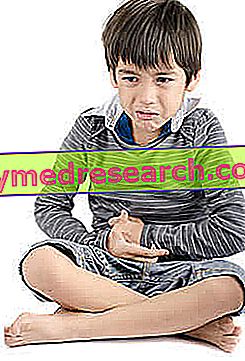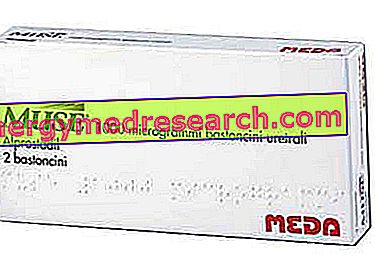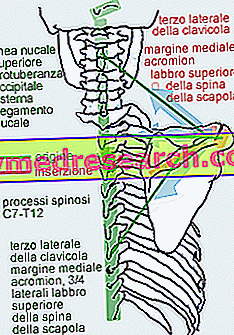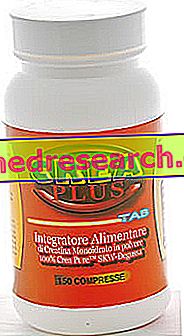Generality
Diarrhea in children is a rather frequent gastrointestinal disorder, which can be caused by factors of various origins and nature.

Diarrhea affects children of both sexes and of all ages, from infants to school-age children.
Fortunately, in most cases, diarrhea in children is a very annoying disorder, but one that can easily be resolved.
In any case, diarrhea should never be underestimated, as it could be a symptom of even very serious underlying diseases.
Causes
The causes of diarrhea can be multiple and of the most varied nature. Among these, we recall:
- Infections, usually sustained by bacteria (such as salmonella, shigella, etc.), but which in some cases can also be caused by viruses;
- Intestinal parasitosis;
- Food allergies or intolerances;
- Taking drugs, such as antibiotics;
- Congenital or acquired malabsorption;
- Inflammatory gastrointestinal disorders, such as, for example, Crohn's disease;
- Tumors of the gastrointestinal tract.
As can be seen, the causes that can favor the appearance of diarrhea vary from milder disorders to very serious pathologies, such as, for example, neoplasms. It is precisely for this reason that diarrhea in children is a symptom that should not be underestimated.
Method of infection and prevention
If diarrhea is caused by bacterial or viral infections, or by parasitic infestations, these can spread and be transmitted from one individual to another through different modalities. For example, infection with the micro-organisms responsible for the onset of diarrhea can also occur in the family environment, living in contact with infected family members.
In other cases, on the other hand, the infection can occur if the most common hygiene rules are not respected. However, diarrhea in children dependent on poor personal hygiene is much more prevalent in developing countries than in developed ones.
To prevent diarrhea in children caused by infections, it is generally sufficient to follow a few simple guidelines, such as:
- Wash the child's hands thoroughly before meals (or their own if the child does not eat alone);
- Wash your hands well before preparing meals;
- Thoroughly wash the fruit and vegetables before giving them to the child;
- Cook the meat intended for baby consumption well;
- Do not wash the bowls of domestic animals in the same sink in which they wash their food (in fact, animals can sometimes favor the transport of pathogens responsible for diarrhea).
Symptoms and Complications
In truth it would not properly be correct to speak of "diarrhea symptoms", this because diarrhea in children - as well as that in adult patients - usually constitutes itself a symptom deriving from an underlying pathological condition.
However, it is not uncommon for symptoms such as:
- Abdominal pain and cramps;
- Loss of appetite;
- Abdominal swelling;
- Nausea and vomit;
- Presence of blood or mucus in the stool;
- Body weight loss;
- Temperature.
The intensity of these symptoms, as well as the type, may vary depending on the cause that triggered the diarrhea in the child.
Furthermore, diarrhea in children can cause a huge loss of water and mineral salts, especially when it occurs in association with vomiting. This remarkable salt and water loss can lead to complications such as dehydration, the consequences of which can also be serious.
Therapy
Since diarrhea is a symptom triggered by other basic pathological conditions, it is clear that it is essential to identify, therefore the treatment, of the primary cause that caused the disorder.
For example, if the diarrhea is caused by bacterial infections, the doctor may decide to prescribe the administration of antibiotic drugs. If, on the other hand, diarrhea is caused by parasites, the doctor will opt for the prescription of an anti-parasitic therapy.
In the event that diarrhea in children is triggered by a viral infection (intestinal flu), usually the infection tends to be self-limited and antiviral drugs are not required.
However, in treating diarrhea in children, it is essential to give the child plenty of fluids, to replenish water and mineral salts lost through evacuation. However, in most cases, and especially in very young children, water is not sufficient to restore the salt balance and it is therefore necessary to resort to oral administration - in milder cases and parenterally in most cases severe - of specific saline rehydration solutions .
Furthermore, it may also be useful to take lactic ferments (such as, for example, Enterogermina®) whose task is to promote the restoration of normal intestinal bacterial flora.
In some cases, moreover, the doctor may deem it necessary to administer intestinal adsorbent drugs, such as, for example, diosmectite (Diosmectal®), or drugs that inhibit intestinal secretion, such as acetorfan, also known as racecadotril (Tiorfix®).
The use of drugs that inhibit intestinal motility - which are widely used to treat diarrhea in adult patients (such as, for example, loperamide) - is instead contraindicated in pediatric patients, as it could cause serious side effects.
However, in the case of diarrhea in children, it is essential to immediately contact your pediatrician who, based on the severity of the disorder, the symptoms associated with it and the age of the child, will implement the therapeutic strategy which is best suited to each case.
Supply
To encourage the disappearance of diarrhea in children, it may be necessary to make some minor changes in their diet. These changes depend substantially on the age of the child affected by this disorder and the severity of the latter.
Usually, if the diarrhea is mild, the child can continue to eat normally, taking care to eliminate foods such as fruit, vegetables and dairy products, to which can be added oral rehydration solutions.
On the other hand, in very severe forms of diarrhea, the diet could be completely suspended. While in infants the doctor may advise you to dilute the milk with water or, in the most serious cases, to stop feeding completely.
In any case, it is good not to do one's own thing and always ask for the advice of the pediatrician, who will provide all the information about the foods that the child can eat while suffering from diarrhea.



